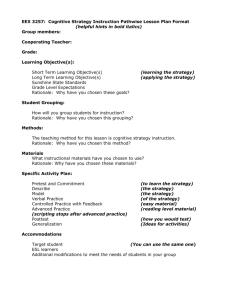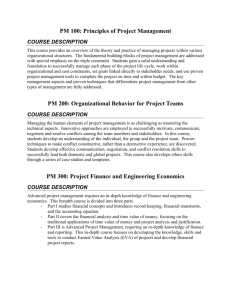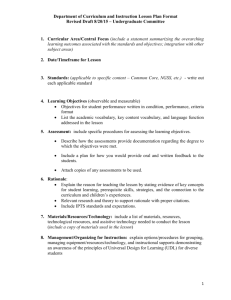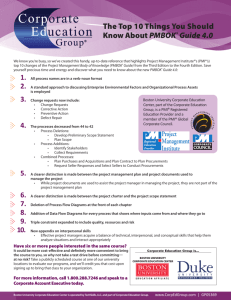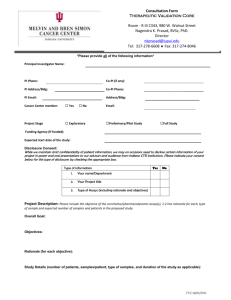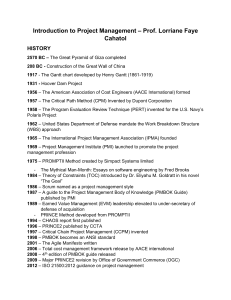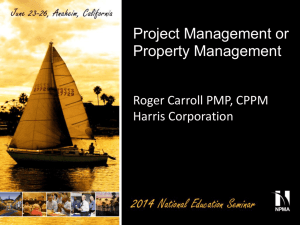Project Management
advertisement
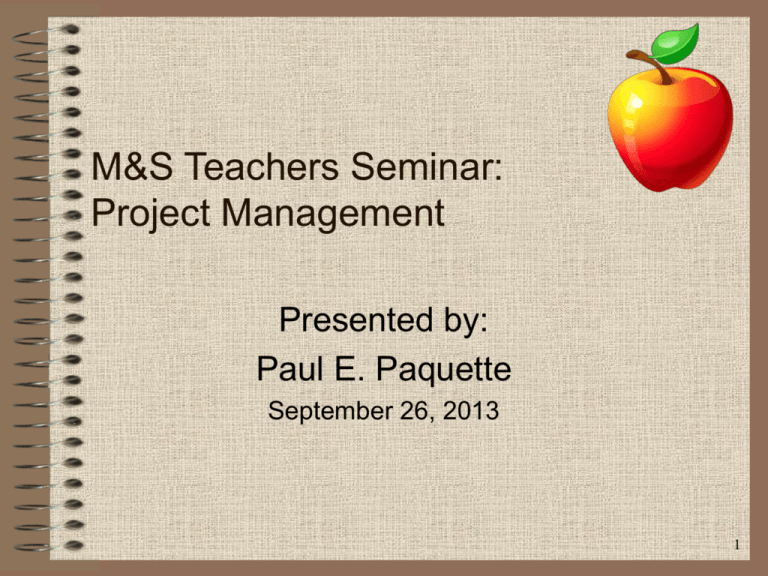
M&S Teachers Seminar: Project Management Presented by: Paul E. Paquette September 26, 2013 1 Unit 10: Project Management Unit Length: This unit will take approximately 40 days. Goals: Understand the Project Management Body of Knowledge (PMBOK) Understand Scope Management. Understand Cost and Risk Management. Understand quality and procurement management Understand communications and human resources management. Rationale: Whether they realize it or not, students are immersed in the discipline of project management each time they plan a school play, plan their graduation, or enter a robotics competition. Exposing high school students to the formal Project Management body of knowledge will better prepare them for their future endeavors, whether that is in College or the workforce. Project Management is a skill that is in great demand across a wide spectrum of industries and organizations. 2 Unit 10.1: Project Management Body of Knowledge Unit Length This unit will take approximately 10 days. Goals: Understand the process groups and knowledge areas that comprise the Project Management body of knowledge, including terminology. Rationale: The management of projects requires a skill set that can be applied to projects of various sizes, commodities and services. The processes for managing projects include new and unique terms requiring definition and understanding. To be able to function in any aspect of business, government or academia one has to be familiar with project management. From a career perspective, students entering industry will have a definite advantage by understanding the role and functions of project managers and project teams. Very frequently, teams are interdisciplinary, such as Integrated Product Teams (IPTs) requiring an understanding of how teams function and how the needs of the team members are met. Objectives: 1. Define a Project. 2. Define Project Management. 3. Define the role of a Project Manager. 4. Define the role(s) of Project Stakeholders. 5. Discuss the Project life cycle. 6. Define the five Project Management Process groups. 7. Define the Project Management Plan & subsidiary plans. 8. Define the Project Charter 9. Define Project Scope 3 Unit 10.2: Scope and Time Management Unit Length: This unit will take approximately 10 days. Goals: Demonstrate an understanding of Scope Management and be capable of constructing a project schedule Rationale: Project Managers are responsible for the cost, schedule, and performance of the deliverable product and services required under the terms of the contract. The contract normally includes a specification or statement of work that describes what the customer intends to be delivered. To estimate how long the project will take, who will do the work and what resources are needed to complete the job, the Project Manager has to break down the project into its component parts and do the estimating. This analysis, given certain project management software tools, enables the manager to develop reasonable estimates for doing the work to the customer’s satisfaction. Objectives: This module will build upon the work that the students had previously started in module one. Each student will be expected to: 1. Elaborate the scope of the M&S project identified in module one. 2. Detail the work to be done by creating a Work Breakdown Structure (WBS). 3. Develop a project schedule by: a. Properly sequencing the work to be done (as noted in the WBS). b. Making estimates of the duration required to do the work. c. Assigning resource to the work to be done. 4 Unit 10.3: Cost and Risk Management Unit Length: This unit will take approximately 10 days. Goals: Gain an understanding of the processes involved in Cost and Risk Management. Rationale: Every project has some risk in design, development or delivery and support. Risks can be in performance, schedule and/or cost. The Project Manager must assess that risk in order to develop reasonable cost and schedule estimates. Very often, customers wish to know where those risks are so that they can be involved in risk mitigation. (Working around those risks.) The Project Manager, with his or her team, must identify those risks and determine the impacts anticipated. From that activity, risk mitigation measures are identified to help lessen the effects of the risk areas identified. Objectives: This module will build upon the work that the students had previously started in module two. Each student will be expected to: 1. Create a Performance Measurement Baseline (PMB) for the Project. 2. Create a performance report that displays performance to plan for cost and schedule. 3. Develop an outline for a risk management plan for the M&S project. 4. Brainstorm potential project risks. 5. Create a risk register for the M&S project 5 Unit 10.4: Quality and Procurement Management Unit Length: This unit will take approximately 5 days. Goals: Understand how quality policies, objectives, and responsibilities help ensure that the project satisfies the needs for which it was undertaken and define procurement and how it relates to project management. Rationale: Years ago, a company had the advertising slogan, “The quality goes in before the name goes on.” Quality assurance is vital and can be managed under the umbrella of a Quality Plan. Companies have quality standards that everyone in the organization must follow. This is important because the customer is expecting a quality product and by using acceptable processes, the probability of delivering a quality product is much greater. In addition, a close interface must be established between the Project Manager and the contracts or procurement department. Objectives: This module will build upon the work that the students had previously started. Each student will be expected to: 1. Develop an outline for a quality management plan for the M&S project. 2. Define Procurement and how it relates to project management. 3. Describe the types of contracts and how contract type is used to manage risk. 6 Unit 10.5: Communications and Human Resources Management Unit Length: This unit will take approximately 5 days. Goals: Demonstrate an understanding of the processes involved with project communications and human resources management. Rationale: The free flow of information within a project is vital to performance. Project teams can include members representing different disciplines and it is necessary for those team members to communicate. Today, most communications take place electronically. However, face-to-face meetings are very important. Integrated Product Teams (IPTs) are used throughout the government and processes are available on the internet. Also, team members can participate in collaborative design through electronic means. The objective is to have information shared among all team members, including Human Resources. Objectives: 1. Develop a Communications plan for the M&S Project. 2. Develop performance reports for the M&S project. Reports should provide status and progress information, at the level required by the stakeholders, as documented in the communications plan. 3. Develop an outline of a Human Resources plan for the M&S Project. 7 PM Career Fast Facts Between 2010 and 2020, 15.7 million new project management roles will be created globally across seven project-intensive industries: Manufacturing Business Services Finance and Insurance Oil & Gas Information Services Construction Utilities * The healthcare industry is projected to increase project management roles by 30 percent – a higher growth rate than any current project-intensive industry. This enormous anticipated growth, along with higher-than-average salaries, will make the next seven years an opportune time for professionals and job-seekers to build project management skills. Project Management Institute (2013), Project Management Talent Gap Report, retrieved from http://www.pmi.org/~/media/PDF/BusinessSolutions/PMIProjectManagementSkillsGapReport.ashx 8 PM Career Fast Facts (cont.) Mean salary in the United States - $ 108,803 Industry Verticals and Salary Aerospace Business Services Construction Consulting Engineering Financial Services Food and beverage Government Healthcare Information Technology Insurance Legal Training Education $110,000 $92,900 $97,000 $120,000 $110,000 $102,000 $103,000 $108,000 $99,500 $104,000 $97,075 $96,500 $90,000 9 Resources A Guide to the Project Management Body of Knowledge (PMBOK® Guide)—Fifth Edition The PMBOK® Guide—Fifth Edition is the preeminent global standard for project management. It provides project managers with the fundamental practices needed to achieve organizational results and excellence in the practice of project management. 10 Resources http://www.pmi.org/ 11 Resources http://www.pmi.org/pmief/default.asp 12 Resources Project Management Toolkit for Teachers™ Case Studies Resources for Students and Teachers 13 Thank You…for all you do! 14

